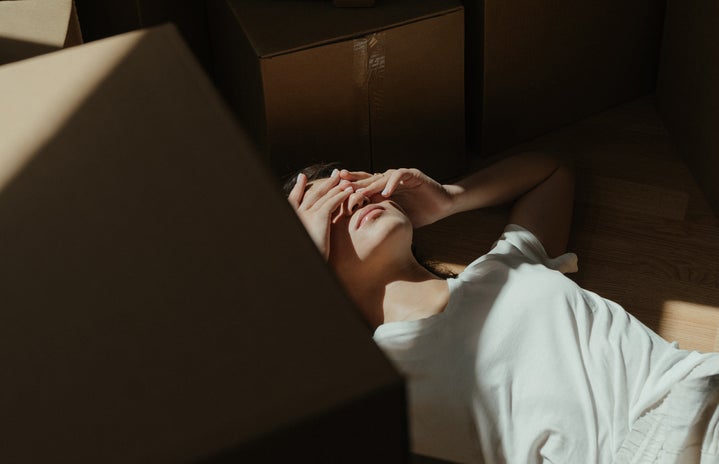In the last year and a half, we have witnessed unprecedented events, and none of us could have prepared for the stress and mental toll that it would take on us. COVID-19 has not only impacted the physical health of many individuals, but also their emotional health, and the pandemic as a whole has had lasting effects on all of us. A study found that 18% of COVID-19 patients developed a mental health issue like anxiety, depression, PTSD, or dementia within 3 months of being diagnosed with COVID-19 (Taquet, Luciano, Geddes, Harrison, 2020.) Even just the stress of worrying about COVID-19 can cause anxiety and social isolation and loneliness can lead to depression. Even before COVID-19, the prevalence of mental illness was increasing, so adding the pandemic onto those already struggling with their mental health led to insurmountable seeming stress. However, there are ways that we can work to combat some of these feelings of loneliness, stress, and anxiety. It’s also critical to seek help early on — all too often we wait until we hit our breaking point to ask for help when in reality you shouldn’t feel as though you have to hit rock bottom to get it. In fact, seeking help early on can help you gain skills to work to prevent some of the negative feelings that come with mental illness. Healing is possible at any point, but we have to be willing to work through things that may feel scary and uncomfortable. I’ve personally felt myself slip into really negative mindsets, and witnessed my mental health dip during points of extreme stress. So, over the summer I made a promise to myself that I would work to take the time needed to focus my energy on healing and creating healthy habits and I’ve decided to share some of these habits with you.
1. Deep cleaning your living space — Clutter has actually been proven to increase levels of cortisol, leading us to feel more stressed and depressed. It can even impede our ability to get sleep and focus (RAGCP, 2019.) Donate any old clothes or things you no longer use, and then organize the things you keep. Also, find ways to incorporate things that make you happy into your living space, whether it’s little motivational quotes on your mirror, pictures of loved ones, new decor, or plants — find little ways to make your space feel like it is your sanctuary.
2. Movement — Exercising and getting your blood flowing is a recommended way to reduce stress. Find whatever makes you feel better: walk your dog, go for a run, go to the gym, take a yoga class, dance around your room — whatever you love, do it. Even if it’s in-between study sessions and classes, studies have found that moving 3 minutes for every 30 minutes you’re sitting can help counter the negative effects of sitting (Reynolds, 2021.) I work from home so I know all too well how easy it is to end up sitting for hours on end. I personally like to get up and go up and down the stairs in my house or do something that gets my heart pumping like jump squats or jumping jacks. Again, do whatever you enjoy because the simplest of things that can add up!
3. Create a routine for yourself — Routines can help combat stress. You can set a schedule for chores, work, school, exercise, etc. Make this a habit and work to ensure you’ll have less Sunday scaries when the weekend passes and time-sensitive tasks are not done. Research has even shown that routine can alleviate bipolar disorder, ADHD, and insomnia (Headspace, 2021.) It’s also important to schedule time for your mental health just as you would with planning a workout. Try spending a few minutes each day thinking/writing down any worries that you have at the present moment.
4. Read — I take it for granted now that I read so much for my classes, but when I was younger I loved to read. Recently, I went and picked up some books to read, not for school, but for myself. Reading has been proven to help reduce stress by 68% according to a study at University of Sussex (The Telegraph, 2009.) You can read anything you like, just try to avoid things that trigger stress; if the news or certain topics make you feel more anxious, look for other things to read.
5. Listen to music — Slower paced music has been found to help induce relaxation response and reduce blood pressure and heart rate, as well as lower cortisol. Instrumental music has been found to work best. There are tons of playlists on Spotify and Apple Music that are specifically created for concentration and relaxation!
6. Learn to say no — Saying no can be scary, but in a time where we often take on more tasks than we can handle, our mental health suffers. If you have too much happening at the moment, it’s okay to say no and let these tasks be delegated among others. It’s also important to say no if you feel uncomfortable doing something or going somewhere, as that can lead to increased feelings of stress and anxiety too.
7. Watch TV — While it doesn’t seem like it would be your typical stress reducer, it’s actually been found that watching TV can reduce women’s stress (Myers, 2017.) So, hop on your favorite streaming service and find a new show to binge!
8. Learn to play an instrument — While it may seem stressful when you’re first learning to play an instrument, it actually can greatly work to reduce stress.
9. Learn to speak a language — Learning a new language can provide stress relief in a few different ways — having a hobby in which we can take time to spend for ourselves can reduce our stress and it can also help us gain confidence and learn to multitask!
10. Do things you love — For the longest time, I felt as though there was always more to do and that I shouldn’t be spending time caring for myself because I had other things to do or people to help. But thinking this way only led me to continually feel burnt out and tired. If there is one thing that the stress of this pandemic has taught me, it’s to make sure that I find a way to do things for myself, even if it’s as simple as lighting a candle and reading a book or going to a farmer’s market. Prioritize taking time for yourself, even if it’s just a few minutes.
11. Professional help — Above all, if you’re experiencing any stress or mental illness symptoms, seeking out professional help is key! Therapists are trained professionals and can help you come up with ways to cope with your symptoms or find ways in which you can work to improve your mental health.
We’ve all had to learn to adapt over the last year and a half, and while being adaptable is important, learning to prioritize all aspects of our well-being is critical too. If you or a loved one is in need of support, call the national suicide prevention lifeline at 1-800-273-8255, or for local support in Utah contact the UNI crisis line at 801-587-3000. There’s also a specific hotline in Utah that is designated for stress about COVID-19 — you can call them at 385-386-2289. September is suicide prevention month, so if you or anyone you know is struggling, please talk to someone. We can all work to prevent suicide.
Citations
Magazine, D. (2017, December 7). 3 surprising Reasons watching Tv might be good for you. HuffPost. Retrieved September 21, 2021, from https://www.huffpost.com/entry/3-surprising-reasons-watching-tv-might-be-good-for-you_b_9811946.
Reynolds, G. (2021, September 8). Move for 3 minutes, every half-hour, to counter the ill effects of sitting, new study finds. The Seattle Times. Retrieved September 21, 2021, from https://www.seattletimes.com/nation-world/move-for-3-minutes-every-half-hour-to-counter-the-ill-effects-of-sitting-new-study-finds/.
Sander, L. (n.d.). What does clutter do to your brain and body? NewsGP. Retrieved September 21, 2021, from https://www1.racgp.org.au/newsgp/clinical/what-does-clutter-do-to-your-brain-and-body#:~:text=Clutter%20can%20make%20us%20feel,whose%20home%20environment%20was%20cluttered.
The secret benefit of routines. it won’t surprise you. Headspace. (n.d.). Retrieved September 21, 2021, from https://www.headspace.com/articles/the-secret-benefit-of-routines-it-wont-surprise-you.
Taquet, M., Luciano, S., Geddes, J., & Harrison, P. (2020, November 9). Bidirectional associations between COVID-19 and psychiatric disorder: retrospective cohort studies of 62 354 COVID-19 cases in the USA. The lancet psychiatry. Retrieved September 21, 2021, from https://www.thelancet.com/journals/lanpsy/article/PIIS2215-0366(20)30462-4/fulltext.
Telegraph Media Group. (2009, March 30). Reading ‘can help reduce stress’. The Telegraph. Retrieved September 21, 2021, from https://www.telegraph.co.uk/news/health/news/5070874/Reading-can-help-reduce-stress.html.




